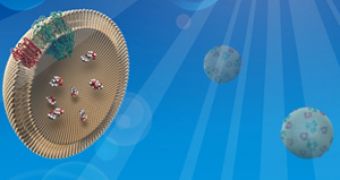Given human society's heavily industrialized ways, keeping rivers and lakes clean is by no means an easy task. A team of researchers now wish to attempt ridding these water sources of harmful antibiotics with the help of so-called solar-powered proteins.
These solar-powered proteins are in fact nano filters that run on energy harvested from the sun.
The researchers who designed them explain that they are basically made up of two bacterial proteins, and that they stand to prove significantly more efficient than other water treatment measures currently in use.
According to the official website for the University of Cincinnati, preliminary tests have shown that the solar-powered nano filters developed by these scientists have an efficiency rate of 64% when made to clean surface waters of antibiotics.
By comparison, the activated carbon-based filtering technology now used on a large scale has an efficiency rate of just 40%.
Commenting on the possible uses of this new technology, specialist David Wendell made the following observations:
“So far, our innovation promises to be an environmentally friendly means for extracting antibiotics from the surface waters that we all rely on. It also has potential to provide for cost-effective antibiotic recovery and reuse.”
The solar-powered nano filters rolled out by these researchers are shaped like spheres, all of which have a diameter fairly smaller than that of a run-off-the-mill human hair.
It is the scientists’ hope that, at one point in the not so distant future, the nano filters might be made to tackle other water pollutants as well.
As David Wendell put it, “Next, we want to test our system for selectively filtering out hormones and heavy metals from surface waters.”
Having antibiotics float about in surface waters is known to trigger both the development of resistant bacteria and the disappearance of microorganisms that benefit the environment.
Therefore, the degradation of aquatic environments and food chains can only be prevented by keeping water sources relatively free of said chemical compounds.

 14 DAY TRIAL //
14 DAY TRIAL //